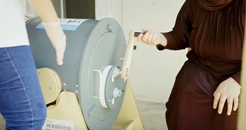 The Washing Machine Project
The Washing Machine Project
The Washing Machine Project, a company based in Wales, provides displaced and low-income communities with an accessible, off-grid washing solution.
The key themes of their work are; women empowerment, alleviating the burden of unpaid domestic work, finding solutions to humanitarian problems through innovative and sustainable engineering, resolving lack of water, sanitation & hygiene facilities, sustainable operations.
70% of the world’s population does not have access to an electric washing machine and infrequent electricity and water supplies mean they are often not a sustainable option. People and most often women have no choice but to wash their clothes by hand. This is a time- and water-consuming task, which places incredible stress and pressure on people’s wellbeing, health and livelihood.
The Washing Machine Project has developed an off-grid, manual washing machine, which saves 60-70% of time and 50% of water, for people in low-income and displaced communities.
This idea was born out of a friendship. Nav Sawhney, their founder, was on a sabbatical in rural South India, making clean cook stoves when he met his neighbour, Divya. It was through their conversations at the end of each day that Nav came to realise the significant burden unpaid labour places on women. Divya would spend up to 20 hours each week washing her family’s clothes, a burden which prevented her from pursuing paid work and caused her to suffer skin irritations and back pain. There are many health risks associated with hand-washing clothes, notably contracting infections and water-borne diseases from direct contact with contaminated water sources.
It is not just Divya who bears this burden. They have spoken to women and communities in 11 different countries around the world. In those communities they have met children as young as 6 who have begun helping with this task. This is detrimental not just to their education but also to their childhoods; to being children.
They are sending 30 hand powered washing machines to be sent to Mamrashan Refugee Camp in Iraq. This will positively impact 300 people and save up to 750 hours annually per household (2 months of daylight hours). They will also be fulfilling orders to refugee camps in Jordan.
Watch this 3 min video:
Could any situations you are supporting use this technology? These could also provide a source of income for a family, operating a manual laundrette.
Retweet about this article:
Geoff Knott, 14/12/2022